

ICT CONTINUUM ACROSS KLAS. Digital Classroom - Year 6. Neighbour and his bravery Designing the Sydney Opera House.
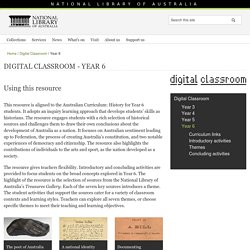
Developing digital literacies. Digital literacies are those capabilities which fit an individual for living, learning and working in a digital society.
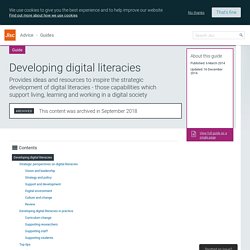
Digital literacy looks beyond functional IT skills to describe a richer set of digital behaviours, practices and identities. What it means to be digitally literate changes over time and across contexts, so digital literacies are essentially a set of academic and professional situated practices supported by diverse and changing technologies. This definition quoted above can be used as a starting point to explore what key digital literacies are in a particular context eg university, college, service, department, subject area or professional environment. My Digital Passport - Home.
Educational Technology and Mobile Learning: Don't Miss These Google Resources and Lesson Plans for Teaching Digital Citizenship. September 25 , 2014Google Digital Literacy and Citizenship Curriculum is a great resource from Google to help teachers educate their students on the importance of digital citizenship and the different ways and strategies to use to keep themselves safe while using the net.
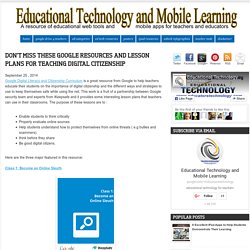
This work is a fruit of a partnership between Google security team and experts from iKeepsafe and it provides some interesting lesson plans that teachers can use in their classrooms. The purpose of these lessons are to : Enable students to think critically Properly evaluate online sourcesHelp students understand how to protect themselves from online threats ( e.g bullies and scammers).think before they shareBe good digital citizens. Here are the three major featured in this resource: Class 1: Become an Online Sleuth. Discovery Education. Digital Passport by Common Sense Media. The Computer School. Digital Literacy & Citizenship Classroom Curriculum. 50 Questions To Promote Metacognition In Students.
50 Questions To Help Students Think About What They Think by Lisa Chesser Using the right questions creates powerful, sometimes multiple answers and discussions.
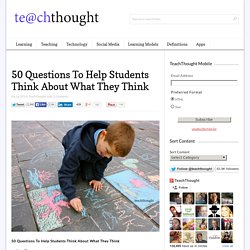
Aristotle said that he asked questions in response to other people’s views, while Socrates focused on disciplined questioning to get to the truth of the matter. Ultimately questions spark imagination, conjure emotions, and create more questions. The questions asked by a teacher or professor are sometimes more glaringly valuable than the information transferred to the students. If students are the ones gathering that information then they’re the ones learning it and student-driven learning cements lessons into the students’ mind making any lesson more powerful with this strategy.
The questions are unrestricted and open the mind up to unfettered thought, perfect for innovation and understanding. CyberWise Privacy Glog: citizenship, digital, İnternet, internet, online, privacy, safety, security, technology. Definition Of Digital Citzenship. The Definition Of Digital Citizenship by Terry Heick As more and more students interact digitally–with content, one another, and various communities–the concept of digital citizenship becomes increasingly important.
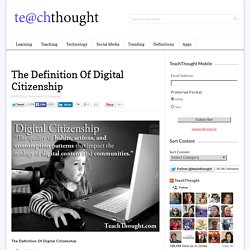
Which begs the question: what is digital citizenship? Well, first citizenship, which is formally defined as “the quality of an individual’s response to membership in a community.” This makes citizenship far more complex than a simple legal matter, but rather one that consists of self-knowledge, interaction, and intimate knowledge of a place, its people, and its cultural history. So digital citizenship is nearly the same thing–“the quality of a response to membership in a digital community” would be a good first crack at the definition. Excellent Tool to Teach Students about Digital Citizenship and Digital Literacy ~ Educational Technology and Mobile Learning. April 22, 2015 Digital Compass is a new tool released by Common Sense Media to help kids learn the fundamentals of digital citizenship and digital literacy through playing interactive games designed specifically for grades 6-9.
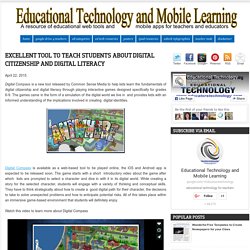
The games came in the form of a simulation of the digital world we live in and provides kids with an informed understanding of the implications involved in creating digital identities. Outreach Cybersafety presentations and workshops for schools and families: Cybersmart. What is Outreach?
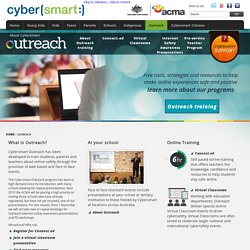
Cybersmart Outreach has been developed to train students, parents and teachers about online safety through the provision of web based and face to face events. The Cybersmart Outreach program has been in high demand since its introduction, with many schools booking for repeat presentations. Over 2015 the ACMA will be placing a high priority on visiting those schools who have already registered, but have not yet received, one of our presentations. For this reason, from we will not take new or repeat bookings for Outreach internet safety awareness presentations and PD workshops. Project Information Literacy: Smart Talks. Howard Rheingold: "Crap Detection 101: Required Coursework" Project Information Literacy, "Smart Talks," no. 5, January 3, 2011 Subscribe our Smart Talk RSS feed Printer-friendly version Photo Credit: Judith Maas Rheingold If one word captures Howard Rheingold's writing about the political, cultural, and social impact of new technologies, that word is prescient.
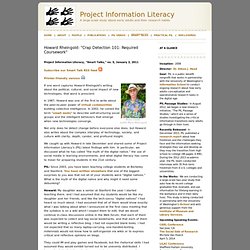
In 1987, Howard was one of the first to write about the peer-to-peer power of virtual communities building collective intelligence. Not only does he detect change before everyone else does, but Howard also writes about the complex interplay of technology, society, and culture with clarity, depth, candor, and profound insight. Scope & Sequence. Get Trained.
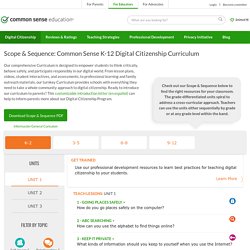
TRAILS: Tool for Real-time Assessment of Information Literacy Skills. TRAILS-9 not active, content moved As of July 1, 2019, TRAILS-9 is no longer an active site.
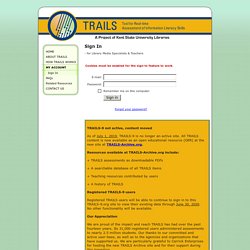
All TRAILS content is now available as an open educational resource (OER) at the new site at TRAILS-Archive.org. TEDxNorthernSydneyInstitute" Video at TEDxTalks. Thoughtful Learning: Curriculum for 21st Century Skills, Inquiry, Project-Based Learning, and Problem-Based Learning. The 21st century skills are a set of abilities that students need to develop in order to succeed in the information age. The Partnership for 21st Century Skills lists three types: Learning Skills Critical Thinking Creative Thinking Collaborating Communicating. Thoughtful Learning: Curriculum for 21st Century Skills, Inquiry, Project-Based Learning, and Problem-Based Learning. How to Spot Fake News (and Teach Kids to Be Media Savvy) SNOPES: definitive fact-checking. Fake news. It's complicated. - First Draft News.
This article is available also in Deutsch, Español, Français and العربية By now we’ve all agreed the term “fake news” is unhelpful, but without an alternative, we’re left awkwardly using air quotes whenever we utter the phrase. The reason we’re struggling with a replacement is because this is about more than news, it’s about the entire information ecosystem. And the term fake doesn’t begin to describe the complexity of the different types of misinformation (the inadvertent sharing of false information) and disinformation (the deliberate creation and sharing of information known to be false). Lesson Plan: How to Spot Fake News. The problem of fake news came to a dizzying head in 2016 when a man fired a shot in a family pizzeria as he “self-investigated” a false report of a child abuse ring led by top democrats.
A BuzzFeed report confirmed that fake news stories, such as the one that claimed Hillary Clinton sold arms to ISIS, were actually viewed more times than articles from established and legitimate news sources. Did fake news have an impact on the election? How do we address the problem from here? This lesson plan features a Channel One News report on the problem. How To Detect Fake News With These Tools and Techniques. Fake news lesson plan. Fake News. What’s the point of education if Google can tell us anything? Can’t remember the name of the two elements that scientist Marie Curie discovered? Or who won the 1945 UK general election?
Or how many light years away the sun is from the earth? Ask Google. Constant access to an abundance of online information at the click of a mouse or tap of a smartphone has radically reshaped how we socialise, inform ourselves of the world around us and organise our lives. How To Spot Fake News. The Problem with Fake News (and how our students can solve it) 10 fact-checking sites to build students' media literacy skills. Here’s a handy cheat sheet of false and misleading “news” sites — Quartz. Earlier this month, the California department of health released guidelines warning residents to avoid putting mobile phones up to their heads. “Keep your phone away from your body,” the state health department writes. “Although the science is still evolving, some laboratory experiments and human health studies have suggested the possibility” that typical long-term cell phone use could be linked to “brain cancer and tumors of the acoustic nerve,” “lower sperm counts,” and “effects on learning and memory.”
Mobile phones emit radiation, which is measured in radio-frequency (RF) energy. In the manual that comes pre-installed on your iPhone, Apple explicitly tells you to use a hands-free option like speakerphone or headphones while talking in order to “reduce exposure to RF energy.” The manual also notes that cell phones are currently tested for radiation assuming the devices would be kept at least 5 mm (0.2 in) away from the body while being carried. Fake news? Bias? How colleges teach students not to be duped. Media literacy — some say media illiteracy — is having a moment.